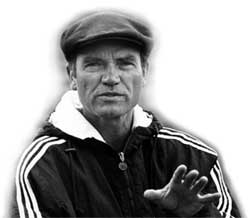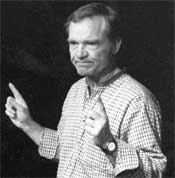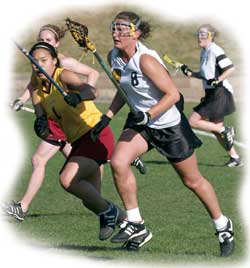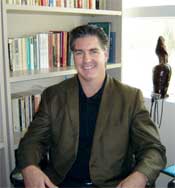
| Balancing Academics and Athletics | |
| by Anne Christensen |
 |
| Horst Richardson has taught German and coached men's soccer at CC for 39 years. |
CC’s Block Plan means that drama classes produce plays from audition to production in six weeks, giving Epstein time to rehab his knee before returning to the team. Richardson, a bit of a Renaissance man himself (German professor, actor, sometime philosopher), wanted Epstein to try something new during his “time off” from athletics, something else with which to balance his academic load. When cast as Romeo, injured soccer star Epstein got a poignantly pertinent line: “Courage, man; the hurt cannot be much.”
Even without Romeo — er, Epstein — for much of the season, the team earned its spot in the regional playoffs in Southern California. By tournament time, Epstein was healed, but alas, the play and the playoffs were scheduled for the same weekend, and he was expected to star in both — 1,000 miles apart. As Romeo asked himself, “Can I go forward when my heart is here?”
 The drama department, no doubt reluctant to hear Juliet’s “Wherefore art thou, Romeo?” speech remain a monologue without Romeo below her balcony, worked with Richardson to find a way to share their mutual star. The compromise: If the soccer team won its first game Saturday without Epstein, the drama department would reschedule Sunday’s play from afternoon to evening to allow Epstein to fly back to California for the Sunday morning game. The plan worked, as Epstein caught a predawn flight Sunday. “But, soft! what light through yonder window breaks?” He scored the winning goal in California, then flew back to campus to die on stage Sunday night.
The drama department, no doubt reluctant to hear Juliet’s “Wherefore art thou, Romeo?” speech remain a monologue without Romeo below her balcony, worked with Richardson to find a way to share their mutual star. The compromise: If the soccer team won its first game Saturday without Epstein, the drama department would reschedule Sunday’s play from afternoon to evening to allow Epstein to fly back to California for the Sunday morning game. The plan worked, as Epstein caught a predawn flight Sunday. “But, soft! what light through yonder window breaks?” He scored the winning goal in California, then flew back to campus to die on stage Sunday night.
Before the Block Plan, students could miss classes for athletic trips more easily, says Richardson, who has coached at CC for 39 years and remembers those days of shorter, more frequent trips. Now, Richardson and other coaches use block breaks for a series of away games — “quality travel experiences,” he calls them, arranging Outward Bound-style breaks for competition, adventure, and relaxing. When students return, he says, they are refreshed and eager to get into the next block. Semester-based teams, Richardson says, cannot undertake three such sustained athletic challenges in a season.
 |
| “Lacrosse forces me to plan ahead, structuring my days and weeks according to our game and travel schedules,” says Cassie Abel ’05. “Lacrosse is a perfect break from the demands of the Block Plan — every afternoon, I have the chance to spend three hours doing something I love, and that allows me to put extra focus on what I need to accomplish the rest of the day.” |
| Photo by Charlie Lengal |
Lacrosse star Cassie Abel ’05, CC’s first three-time All-American and a 3.4 GPA economics graduate, echoes Richardson’s view on that balance. “Achieving peak performance on the field goes hand in hand with achieving success with the demands of the Block Plan. I, for one, am a very routine- and goal-oriented person. I am much more successful with whatever I do when I have structure to my day; thus, I feel more on top of things in lacrosse season, when I havepractice to structure my day around.”
From his vantage point as both professor and coach, Richardson says that the Block Plan simply demands that students develop a higher level of time management skills. “It’s not a disadvantage, because this isn’t a perfect world. Given the inevitability of time conflicts, it’s a fabulous preparation for life. What I appreciate about our student–athletes is that they’re not just jocks. Yes, they are committed to sports, but they are able to balance that and academics.”
Where Are They Now? Read about CC soccer players who went pro, then went on to other careers.
Turning the Tables on the “Too Deep” Jock
 by Tim Pytell ’85
by Tim Pytell ’85
After 12 years of parochial school and a year of floundering, I arrived at CC completely focused on athletics. My dream was to play major league baseball; I found nothing more satisfying than catching a long bomb, swishing a jump shot, or stroking a single over the second baseman.
I wasn’t the quintessential dumb jock. I had read Herman Hesse’s entire oeuvre, dabbled in C.S. Lewis and Somerset Maugham, contemplated reading Ayn Rand, struggled through passages of Nietzsche. But my intellectual curiosity found little support among my family and friends. My parochial school education was solid on the fundamentals (except Darwin, of course!) but rather narrow in other aspects. Attempts at serious philosophic conversation brought bewildered stares or comments like, “Pytell is too deep.”
At CC, professors like Susan Ashley, Dan Tynan, John Riker, Marcia Dobson, Harvey Rabin, Jeff Noblett, and Doug Freed (and that’s the short list!) turned the tables on me. Suddenly I was being asked to think hard, challenged to fully understand complex ideas. A whole world opened up to me, a community centered on the life of the mind, where being an “intellectual” was both supported and expected. By my sophomore year, I was enthralled with history, philosophy, and psychology, and to this day, I remain so.
It took time to find the balance between the demands of athletics and academia at CC. Often I found myself immersed in philosophic discussion in the middle of football practice or in the baseball dugout. I remember reading Nietzsche’s “Zarathrustra” on a football bus to Nebraska, and the almost surreal 20-minute transition from afternoon philosophy class to donning a football helmet.
Initially, bridging the gap between the domains of athletics and academics seemed impossible, and I felt schizoid. But over time I came to realize that these two dimensions, the physical and the mental, are indeed complementary. That is, in the Nietzschean sense of becoming, I had to be both physical and mental. That is who I am. Put in another way, for me, a well-executed telemark turn on skis is like experiencing Henri Bergson’s concept of duration. I had to pursue both realms in order to become fully who I am.
Cal State history Professor Tim Pytell played three varsity sports as a Tiger. He was a visiting professor at CC for two years, and recently received a note from a graduating hockey player saying thanks for helping him “understand what the liberal arts experience is all about.”